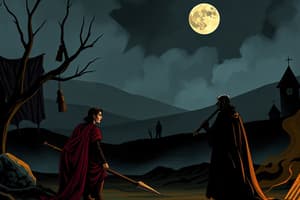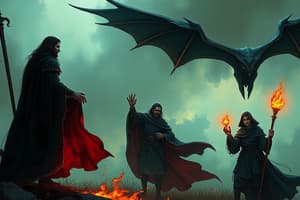Podcast
Questions and Answers
What does Banquo express to Macbeth before they part ways?
What does Banquo express to Macbeth before they part ways?
- His suspicion of Macbeth's intentions
- His intention to leave the castle
- His desire to confront the king
- His dreams of the weird sisters (correct)
What significant visual experience does Macbeth encounter before approaching the king's chamber?
What significant visual experience does Macbeth encounter before approaching the king's chamber?
- A ghostly dagger leading the way (correct)
- A bright light signaling danger
- The figure of Banquo
- A reflection of his own face
How does the atmosphere of the scene transition from Duncan's arrival to Act II's opening?
How does the atmosphere of the scene transition from Duncan's arrival to Act II's opening?
- From bright daylight to dark stormy conditions
- From chaotic noise to tranquil stillness
- From festive celebrations to somber silence
- From airy lightness to brooding darkness (correct)
What does Macbeth's soliloquy about the dagger reveal about his mental state?
What does Macbeth's soliloquy about the dagger reveal about his mental state?
What is the tone of Macbeth’s final lines as he ascends to the king's chamber?
What is the tone of Macbeth’s final lines as he ascends to the king's chamber?
Which of the following elements is highlighted through Banquo's character in this scene?
Which of the following elements is highlighted through Banquo's character in this scene?
What is the significance of the term 'Murder' in Macbeth's final lines?
What is the significance of the term 'Murder' in Macbeth's final lines?
What role does dramatic irony play in Macbeth's interaction with Banquo?
What role does dramatic irony play in Macbeth's interaction with Banquo?
Flashcards
Macbeth's encounter with Banquo
Macbeth's encounter with Banquo
Macbeth meets Banquo and his son, Fleance, near the king's chamber. Banquo expresses his concern about dreams.
Brooding Darkness
Brooding Darkness
The atmosphere of the play shifts from the initial lightness to a dark and ominous mood as the night progresses.
Dramatic Irony
Dramatic Irony
Banquo is unaware of Macbeth's true intentions, creating tension and suspense for the audience.
Macbeth's dagger soliloquy
Macbeth's dagger soliloquy
Signup and view all the flashcards
Macbeth's mental state
Macbeth's mental state
Signup and view all the flashcards
Macbeth's Motivation
Macbeth's Motivation
Signup and view all the flashcards
Classical Allusions
Classical Allusions
Signup and view all the flashcards
Study Notes
Act II, Scene 1 Summary
- Macbeth encounters Banquo and Fleance near Duncan's bedchamber.
- Banquo, unable to sleep, recounts a dream featuring the weird sisters.
- Banquo and Macbeth agree to meet again to discuss the dream.
- Banquo reaffirms his loyalty to Duncan and bids Macbeth goodnight.
- Macbeth, alone, experiences a vision of a dagger leading to Duncan's chamber.
- Macbeth is compelled to murder Duncan.
Analysis of Act II, Scene 1
- Setting: The scene is dark and foreboding. The absence of starlight symbolizes a shift from the light and optimistic start of Duncan's arrival in Act I.
- Banquo's Role: Banquo's presence creates dramatic irony. He is unaware of Macbeth's intentions, while the audience is privy to Macbeth's internal conflict.
- Macbeth's Soliloquy (Dagger Scene): This speech is a celebrated example of Shakespearean psychology.
- It displays Macbeth's internal struggle between sanity and temptation.
- The speech includes three instances of Macbeth seeing a dagger.
- Macbeth repeatedly questions his sanity, relying on his senses to ground him.
- Macbeth reveals a strong desire to become King.
- The final lines of the soliloquy show Macbeth's transformation into a murderer.
- Imagery: Macbeth connects himself to the image of murder, utilizing classical allusions (Hecate, Tarquin) in his language.
- Word vs Deed: The scene highlights the difference between words and actions, a recurring theme in Shakespeare.
- Macbeth's Doubts about the Afterlife: Macbeth questions Duncan's fate in the afterlife, highlighting a preoccupation with morality and the consequences of his actions.
Studying That Suits You
Use AI to generate personalized quizzes and flashcards to suit your learning preferences.




